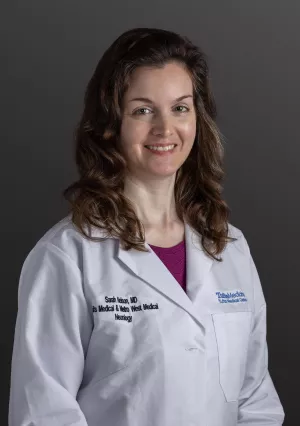
The acknowledgment of Stroke Awareness Month in May is a reminder that stroke is a serious disease that can affect anyone at any age, and it is important to be aware of its symptoms and prevention.
"Stroke is currently the fifth leading cause of death in the U.S, and it can also cause significant disability," said Dr. Sarah Nelson, neurologist at MelroseWakefield Hospital. "While stroke risk is known to increase as people get older, unfortunately it can occur at any age."
Stroke affects the arteries leading to, and also within, the brain. A stroke occurs when blood vessels that carry oxygen to the brain get obstructed by a clot or bursts. As a result, part of the brain cannot receive the blood and oxygen it needs, and brain cells begin to die.
"It's critical to know the signs and symptoms of stroke since treatment of stroke is typically time-dependent – the quicker someone obtains medical treatment sometimes the better they can do," said Dr. Nelson.
"For the most common kind of stroke - an ischemic stroke - a clot-busting medication can be administered if patients present quickly to the hospital – and the sooner it's given the better," she said. "For strokes associated with bleeding in the brain, other medical treatments and possible surgery can be offered to help reverse the effects of the stroke."
"The brain can be quite remarkable," said Dr. Nelson. "People may regain or partially regain certain functions that have been initially lost, such as difficulty swallowing or weakness of an arm or leg after a stroke." "While recovery varies from person to person, and it can be difficult to say how much someone will improve after their stroke, knowing the signs and symptoms of stroke and coming to the hospital as soon as possible to receive potential treatments can increase the chances of a stroke patient's recovery."
Alteplase and Tenecteplase are drugs used to break up the clots that cause blockages or disruptions in the flow of blood to the brain, and which helps restore the blood flow to the area of the brain.
Knowing the signs can save a life.
The acronym BE FAST is a handy technique to help you quickly recognize common signs of a stroke. This outlines questions to ask about the telltale signs your friend or loved one may be having a stroke, plus action to take:
B – Balance - Is the person suddenly having trouble with balance or coordination?
E – Eyes - Is the person suddenly experiencing blurred or double vision or loss of vision in one or both eyes without pain?
F - Face Drooping - Does one side of the face droop or is it numb? Ask the person to smile.
A - Arm Weakness - Is one arm weak or numb? Ask the person to raise both arms. Does one arm drift downward?
S - Speech Difficulty - Is speech slurred, are they unable to speak or are they hard to understand? Ask the person to repeat a simple sentence like, "The sky is blue." Is the sentence repeated correctly?
T - Time to call 911 - If the person shows any of these symptoms, even if the symptoms go away, call 911 and get them to the hospital immediately.
Prevention
In the US, leading causes of stroke include high blood pressure, diabetes and smoking. "In order to best prevent a stroke, it's important to live as healthy as possible and control risk factors for stroke," said Dr. Nelson.
If you have high blood pressure, high cholesterol or diabetes, take all of the steps you need to take to manage them properly.
Visit and talk to your doctor. Take your prescribed medications and have your recommended lab work and screenings. Exercise, keep your weight down and eat a healthy diet.
If you smoke, stop!
MelroseWakefield Hospital is a community leader in stroke treatment and is a designated Primary Stroke Service hospital by the Massachusetts Department of Public Health. It has been recognized by the American Heart Association with a Get With The Guidelines ® – Stroke SilverPlus award for its commitment to ensuring stroke patients receive the most appropriate treatment. The hospital has also been named as a top 100 Hospital for Stroke Care by Healthgrades, earned The Joint Commission's Acute Stroke Ready Hospital Re-certification and is a recipient of the prestigious Paul Coverdell National Acute Stroke Program Defect-Free Care Award.